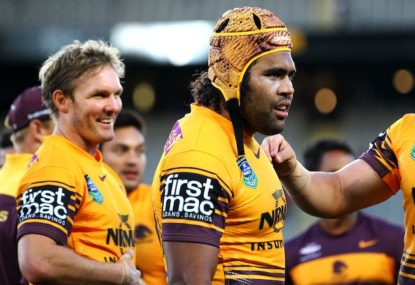'I'm a professional': Joey cracks up Freddy after claim he was 'five beers deep' in sheds interviews
Andrew Johns was running amok in the Chooks sheds after their win over the Broncos. He had Channel Nine colleague Brad Fittler in stitches…

The NRL recently scrapped plans to appoint independent doctors to assess whether players have been concussed during games. To put it simply, it is an appalling decision which threatens the health and safety of players.
Though it is true that club doctors should be capable of diagnosing concussion symptoms, it sends the message that the NRL believes it is doing enough about the issue. That just isn’t true.
The league has started to look into the issue after several club doctors protested an issue they believed the NRL had failed to address.
After leaning towards implementing independent doctors the NRL changed tack, claiming that club doctors were already capable of diagnosing concussions. Obviously, a conflict of interest has arisen.
Allegiances could lead a club doctor to make a decision that benefited the team, rather than the player being checked. However, club doctors will almost certainly maintain their ethics and refuse to put a player suffering a concussion back into the game.
But the bigger problem is the long-term health impact on players who suffer concussions.
The best study for concussions has come in relation to the NFL, which is mired in a massive lawsuit concerning long-term health defects of players.
By late 2009, the NFL was finally willing to admit a link between concussions and the degenerative condition of chronic traumatic encephalopathy (CTE), which many former players of the league suffered from before their deaths.
Repetitive trauma to the head, common in high-contact spots, can quickly lead to CTE, which is characterised by conditions such as dementia, depression, impaired cognition, motor disturbance and aggressive behaviour.
The NRL must change its rules now to compensate for one of the biggest medical issues in sporting history.
Any player who suffers a concussion must not be allowed to play again in the game.
With medical science continually learning more and more about head injuries, concussions are emerging as one of the most dangerous injuries for an athlete to suffer. The long-term injuries are so significant that no player can risk sustained damage to the head.
As the NRL has considered, players found to be suffering from a concussion should not count for an interchange.
This rule should be implemented. It can be combined with input from independent doctors, who have no stake in either team and will never be influenced to make an incorrect medical decision for the sake of the game.
Any player who causes a concussion through an illegal tackle must be removed from the game through a send-off. This is the fair response to the team of the concussed player being brought down to 16 players.
Both teams will have 16 players and no advantage will be gained by causing a concussed player to leave the field.
A player should not return from their concussion the following week until they pass independent tests from doctors.
Any incorrect diagnosis made by a club doctor, which allows a concussed player to stay on the field, should be met with heavy fines by the NRL.
Furthermore, high tackles must be charged with higher penalties than ever to minimise any potential impact to the head.
These rules must be implemented to protect the welfare of players.
The NRL has to recognise and accept that concussions are not like any other form of injury. The potential development of CTE is an ever-present danger and the threat it poses has to be minimised.
The NFL makes a massive revenue each year and, for the time being, can easily afford to fund a medical scheme for its past players. If the NRL can’t get in front of this major issue, though, it could find the biggest threat to its future is in the courtroom.
It doesn’t have the funding at its disposal to deal with a major class-action lawsuit from former players. The health of players has to come first and it’s time for the NRL to act with that in mind.